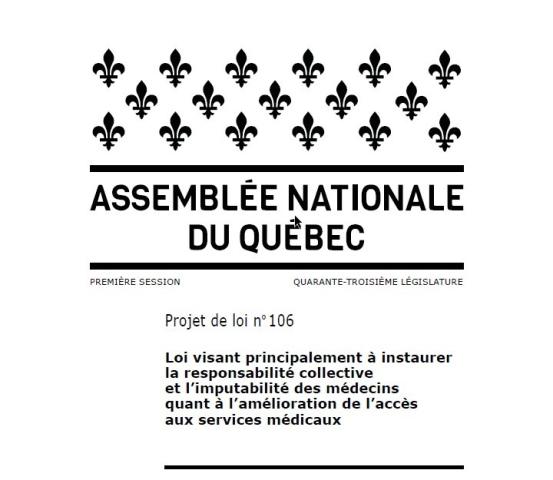
Below is the email we sent to you on May 28, 2025, following the Parliamentary Committee on Bill No. 106 from May 27 to 29, 2025.

With Bill 83 having been adopted barely a month ago, the government is now serving us up new, even more restrictive draft legislation—Bill 106, An Act mainly to establish the collective responsibility and the accountability of physicians with respect to improvement of access to medical services. The Bill was tabled only on May 8, 2025, but Minister Dubé was quick to invite the medical federations and other healthcare system organizations to present their positions at Parliamentary Committee hearings scheduled for May 27–29. We received our invitation on Friday, May 16, at close of day, leaving us with barely 10 days for preparing to comment on a 40-page draft statute on a highly technical subject, physicians’ compensation. That in itself demonstrated a blatant lack of respect, leaving little room for doubt that the government’s real objective behind this Bill is not to launch a debate on healthcare system organization, but rather to exert pressure on the FMOQ and FMSQ in their respective negotiations.
We nevertheless met on Tuesday, May 27 with the members of the Quebec National Assembly Committee responsible for holding consultations on the Bill. The President of the Fédération des médecins résident·e·s du Québec, Dr Ghassen Soufi, addressed the Committee, criticizing in his speech this new draft legislation against doctors, a Bill purportedly targeting enhanced access to care for Quebecers and an increase in the volume of healthcare delivered, but not providing physicians with any means at all to do more.
Dr Soufi pointed out that resident doctors work in the public healthcare system throughout their residency and all want to remain in the public system, provided only that the necessary resources are there. He stressed that the future of the healthcare system in Quebec needed to be discussed, outlined the perspective of the upcoming generation of physicians, and highlighted the damage this new Bill could cause.
When all healthcare stakeholders argued back in February 2025 that Bill 83 was proposing inadequate solutions to the system’s problems, Minister Dubé told us it was just a start, other measures would contribute to enhancing the system. But we know what followed—cutbacks, postponed updating of crumbling infrastructure, and even boxes of tissues for patients no longer being provided. The Minister and his government apparently heard nothing of what was said in the Parliamentary Committee hearings, and rather than doing anything to enhance the system, they did the opposite. But their new idea—which smacks of electioneering, one year ahead of Quebec’s elections scheduled for 2026—is just a way of diverting public attention from major problems by blaming doctors for causing all the problems the government is unable to deal with.
We do not have enough operating rooms and staff, hospital walls are crumbling, and it is family physicians delivering primary care who are carrying the system on their shoulders, notably owing to the unreasonable red tape imposed on them. We reminded Committee members that doctors are already taking on a colossal task load: they manage patients with increasingly difficult and complex health issues, and sit on committees to assess the medical act in order to enhance care, quite apart from devoting time to research and training the upcoming generation of doctors.
Despite all this, the government continues to denigrate doctors constantly, saying they are lazy: “they don’t work enough or at the right hours, and don’t see enough patients.” The government wants to impose a practice on us based on statistics with no connection to reality, rather than promoting a human approach toward our patients.
In our view, Bill 106 serves only to instrumentalize doctors, both to give the public the impression that the government is going to resolve all the public healthcare system’s issues, and to try to force the medical federations to accept their demands at the respective negotiating tables. What we need is a sustainable plan that fosters human medicine, and not merely medicine based on statistics and bureaucracy.
We are therefore continuing to lobby the government and opposition parties while working with the other medical federations to ensure that the restrictive measures proposed in this Bill do not come into force. We will be keeping you up to date on developments in that regard.
Your Federation